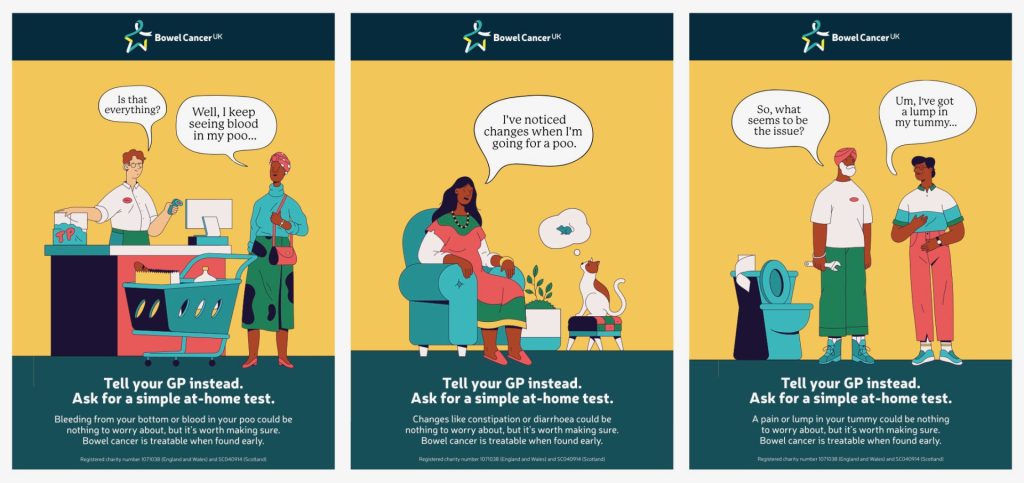Increasing early diagnosis of bowel cancer for Bowel Cancer UK

Bowel cancer is treatable and curable, yet it’s the UK’s second biggest cancer killer. Half of those diagnosed are in later stages when their bowel cancer is likely to be harder to treat, and less survivable.
Bowel Cancer UK wanted to run a campaign to improve early diagnosis, with a focus on those who are least likely to visit their GP with symptoms, including those from more deprived backgrounds.
We worked with the charity, its supporters, and academic experts to co-design a behaviour change campaign strategy to encourage people to seek help sooner for symptoms.
Our research identified the critical barriers to address, including fear, fatalism, embarrassment, and distrust of GPs. We then tested and evolved creative territories – including mockup scamps of campaign ads – working with our co-design group of people living with bowel cancer. The group helped us further understand barriers and motivations, and to weed out any unintended consequences of potential messaging for those who are least likely to see their GP.
Our strategy built on the research insights to recommend an approach combining hope and urgency and one that addressed audience barriers specifically. We went on to undertake journey mapping work to understand how people with potential bowel cancer symptoms seek further information and help, in order to get diagnosed. We supported the charity to redesign its SEO, PPC and content strategy to encourage people to identify symptoms and get tested.
Working with our media partner, Yonder, we developed a a hyper targeted, community based, pulsed model. Rather than investing in awareness peaks, which have been shown to have limited impact on long term behaviour change, we created a campaign that runs continuously for a nine month period across radio, print, OOH and dynamic digital. We hope that being embedded within communities for a longer period will lead to more sustained action.
Claremont collaborated closely with Bowel Cancer UK throughout this process, supporting the campaign from strategy to planning and launch.
Rather than a short, intense burst, the campaign followed a two-weeks-on, two-weeks-off approach over a longer period. This allowed for repeated opportunities to gradually reduce the psychological and practical barriers that often prevent the target audience, particularly over-50s “stoics” and “healthcare sceptics”, from contacting their GP.
And did it work?
The evaluation of “Tell Your GP Instead” points to a promising impact from the campaign.
While measuring behaviour change is notoriously difficult, especially with limited real-time NHS data, the evaluation approach was designed using multiple public and GP surveys alongside campaign performance metrics.
In terms of outputs, the campaign achieved wide engagement:
- Millions reached across the UK
- 6 in 10 campaign-aware individuals recalled at least one campaign element
- Web traffic to key symptom and GP advice pages rose by a staggering 228%.
When focusing on outcomes:
- Those experiencing blood in their poo were more likely to contact their GP (up from 23.7% in March 2024 to 26.4% in March 2025, peaking at 33.4% in July 2024).
- 84% of the target audience said they were very likely to contact their GP after seeing the campaign
- Reports of embarrassment as a barrier dropped significantly among lower socioeconomic groups (from 19.9% to just 8.5%).
- GPs in campaign areas reported higher use of faecal immunochemical tests (FIT), with most saying the increased demand was sustainable
- 1 in 3 GPs aware of the campaign had a patient mention it when presenting with symptoms.